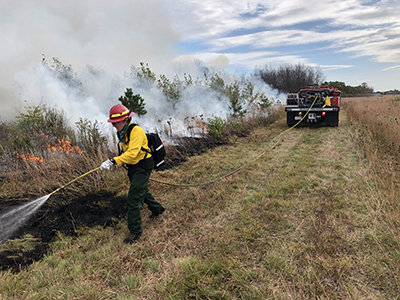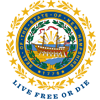Fire Permits
Fire permits are required in New Hampshire to reduce the occurrence of wildfires.
Fire permits have been required in New Hampshire since 1911 and were put in place to reduce fire occurrence during periods of high fire danger and to reduce carelessness with fire by educating the public. The current fire permit system offers both a paper permit and online permit option. The issuance of the fire permit gives fire officials the opportunity to educate the public about safe burning and reduces fires during periods of high fire danger. The fire permit system also allows for fire officials to know where fires are occurring, thus preventing them from responding to controlled fires when smoke is reported.
What does "Ground Covered with Snow" mean?
The area within a 100’ radius from the fire edge is covered with snow or other frozen precipitation sufficient to prevent the combustion of woodland fuels until the fire is completely extinguished.
Do I need a permit to burn?
Yes – Every person, firm or corporation who kindles or causes to be kindled any fire or burns or causes to be burned any material, except when the ground is covered with snow, Shall obtain a written fire permit from the Forest Fire Warden in the town or city where the fire will be kindled.
What are the different permit options?
"Category I Fire" means a small controlled fire, such as a camp or cooking fire, no greater than 2 feet in diameter contained within a ring of fire resistive material or in a portable fireplace, except for public & private campgrounds or picnic sites, located at least 25 feet from structures.
A Category I fire, conditions permitting, may be kindled with a permit at any time or day whether raining or not.
"Category II Fire" means a controlled fire, such as a camp or cooking fire, no greater than 4 feet in diameter contained within a ring of fire resistive material or in a portable fireplace and located at least 50 feet from structures.
A Category II fire, conditions permitting, may be kindled with a permit only between the hours of 5:00 p.m. and 9:00 a.m. unless it is actually raining.
"Category III Fire" means any other fire, not a Category I or Category II fire or a fire greater than 4 feet in diameter or a fire not contained within a ring of resistive material and located at least 50 feet from structures.
A Category III fire, conditions permitting, may be kindled with a permit only between the hours of 5:00p.m. and 9:00a.m. unless it is actually raining. Category III permits may be issued for up to 7 days.
What does "Open Burning" mean?
The burning of any material wherein products of combustion are emitted directly into the ambient air without passing through a stack or chimney from an enclosed container. The use of portable fireplaces is considered open burning.
How old do I have to be in order to obtain a fire permit?
You must be 18 years of age or older to obtain a permit or to be a permittee.
Can I get a permit online?
Yes – if your Town has opted into the online permit program, visit NHFirePermit.com.
Can I get a fire permit locally?
Yes – If you do not want to get your fire permit online, it can be obtained locally through the Forest Fire Warden, Deputy Wardens and Issuing Agents. You can contact your Town Office or Fire Department to find out who your town Forest Fire Warden is.
Do I have to stay with my fire?
Yes – "Attended" means that an individual responsible for the fire and capable of extinguishing the fire is on the same property as the fire, is able to immediately extinguish the fire, and has the fire in plain view.
What materials can be burned with a fire permit?
Only burning of untreated wood, untreated pallets, campfire wood, brush, or charcoal is allowed. Wood can be no greater than 5 inches in diameter. Construction or demolition materials shall not be burned. The NH Department of Environmental Services has published this quick guide to explain what is allowed to be burned.
Can I burn wood that has been painted, stained or pressure treated?
No – Only burning of untreated wood, untreated pallets, campfire wood, brush, or charcoal is allowed. Wood can be no greater than 5 inches in diameter, construction or demolition materials shall not be burned.
If I started my Category II or III fire while it was raining and it stops raining, do I have to extinguish the fire?
Yes – "Raining" means sustained precipitation that is actively occurring of sufficient intensity and duration so as to prevent the fire from spreading in woodland fuels.
For fire permits, who qualifies as a "permittee"?
"Permittee" means a landowner or a person having written permission from the landowner. If you are not the landowner, use the Permit Authorization Form to get permission from the landowner and bring it with you when you get your permit.
What is a "completely extinguished fire"?
A "Completely Extinguished Fire" means to extinguish, with water, so that it emits no smoke, heat or flames. The term does not include a buried fire. Knowing how to put out a campfire is your responsibility when you burn.
Is there a penalty for burning without a fire permit?
Yes – Any person violating any provision of the section shall be guilty of a misdemeanor, and any person who causes or kindles a fire by any means, willfully or recklessly, which shall endanger a woodland shall be guilty of a misdemeanor if a natural person, or guilty of a felony if any other person. A written fire permit shall be Summarily Suspended and an Official Notice or Summons may be issued for violation of the rules or laws.
In addition, Any person, firm or corporation causing or kindling a fire without a permit, when a permit is required, and also any person by whose negligence or the negligence of his agents any fire shall cause, is liable to the town for all expenses incurred in attending or extinguishing such fire. If fire escapes from control you may be held liable for:
- Payment of damage to property of another;
- Payment of suppression costs to the town;
- Prosecution for failure to comply with regulations.
Is there a printer friendly version of these questions?
Yes – A synopsis of these questions and answers are found in the Fire Law Brochure. You can also contact your local Forest Fire Warden, a Forest Ranger or your local fire department if you have questions.





